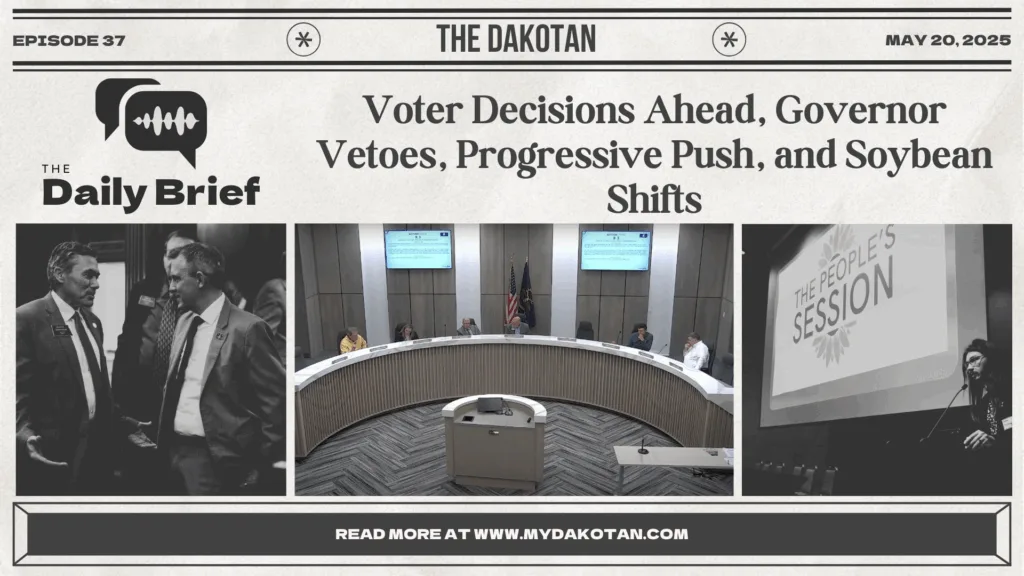

The Minot City Council convened Monday to recognize National Public Works Week, receive a legislative update, and tackle a packed agenda covering budget planning, infrastructure, and public safety. Finance Director Dave Lakefield outlined multi-year budget projections and the city approved a new HR Director while announcing a June 5 town hall on flood control. Three finalists for Police Chief will participate in a public meet-and-greet on May 27. Routine items passed smoothly, though a mosquito spraying contract drew dissent from Alderman Blessum over health concerns before passing 5-1. The Council also approved its five-year Capital Improvement Plan, removing an unfunded $8 million bridge project. The most contentious issue centered on the proposed use policy for Flock license plate readers; amendments passed unanimously, but the Council voted 4-2 to delay a final decision until the full body is seated, amid transparency concerns and warnings of potential surveillance overreach.
At the inaugural People’s Session held on May 16, 2025, at the North Dakota Heritage Center, approximately 40 progressive residents convened to craft a legislative agenda for the 2027 session. Organized by groups including the North Dakota Human Rights Coalition and the ACLU of North Dakota, participants emphasized the need for stronger public education funding, expanded early childhood education, economic reforms such as raising the minimum wage and taxing out-of-state interests, and protections for personal freedoms including reproductive rights and gender-affirming care. The event aimed to translate community concerns into actionable policy proposals, with plans to draft bills over the next year and revisit the issues in spring 2026.
On May 19, 2025, North Dakota Governor Kelly Armstrong issued seven line-item vetoes across six bills, aiming to remove policy provisions he deemed improperly embedded within budget legislation. Notably, he vetoed a section of the Ethics Commission’s budget that would have granted lawmakers immunity from prosecution for conflicts of interest if they adhered to internal ethics guidelines, arguing it could shield legislators from accountability under state law. Armstrong also struck down measures including a restriction on judges waiving fees for the 24/7 sobriety program, a $150,000 grant for a Native American homelessness liaison, a $250,000 study on post-oil economic development, and a requirement for legislative approval to rename state parks. He contended that such provisions, lacking direct appropriations, encroached upon executive authority and disrupted the separation of powers. Senate Majority Leader David Hogue acknowledged the vetoes but indicated they were unlikely to prompt a special legislative session.
In the 2025 legislative session, North Dakota lawmakers approved three constitutional amendments to be placed on the 2026 ballot. The first measure proposes raising the threshold for passing constitutional amendments from a simple majority to 60%, aiming to make such changes more deliberative. The second introduces a single-subject rule, requiring ballot initiatives to focus on one issue, thereby preventing multifaceted proposals. The third seeks to amend the state’s term limits law, allowing legislators to serve up to 16 years in one chamber and clarifying that partial terms do not count toward the limit. These measures have sparked debate, with supporters advocating for more structured governance and opponents expressing concerns over potential restrictions on direct democracy and voter participation.
North Dakota soybean farmers are adapting to a shifting global market landscape, marked by ongoing trade tensions with China and the emergence of new domestic processing opportunities. Historically reliant on exports to China, which has been a significant buyer of U.S. soybeans, farmers like Jim Thompson acknowledge the challenges in replacing such a vast market. However, the recent establishment of two soybean crushing plants in the state—Green Bison at Spiritwood and North Dakota Soybean Processors near Casselton—has provided alternative avenues by producing soybean oil for renewable fuels and soymeal for livestock feed. These developments have lessened dependence on exports, offering some insulation against international market fluctuations. Despite a temporary reduction in tariffs between the U.S. and China, American soybeans remain less competitive compared to Brazilian exports, which currently dominate China’s imports. Efforts to diversify markets include outreach to countries like Cambodia and Kazakhstan, though logistical challenges persist. As the global trade environment remains uncertain, North Dakota farmers continue to seek strategies to stabilize and expand their market presence.